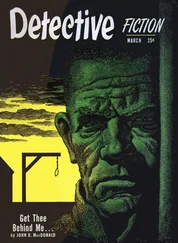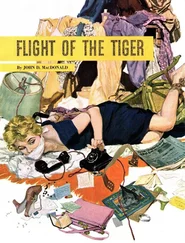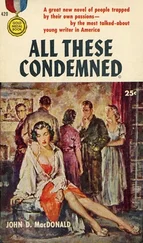“Actually, it’s death, isn’t it?”
“Now let us not be emotional, Dr. Inly. I had hoped that as a psychiatrist and a neuro-surgeon, you would—”
Sharan forced a smile. “I guess it’s time for confession, Doctor. We all thought up this Watcher business as a publicity thing. We all needed money.”
He shook his head sadly. “Surely you know better than that! Such a perfectly standard reaction, Dr. Inly. Under induced hypnosis you all clung to every single phase of the shared delusion.”
“A question then. If a delusion can be shared, possibly it isn’t a delusion.”
He chuckled, at ease for the first time in the interview. “You people! Don’t you see that basically it’s a desire for escape? The world as you know it has become unbearable for the four of you. Too bad you didn’t recede into a catatonic state. We could have treated that. Instead you invent a delusionary race on a far planet on which you can blame your own inadequacies. Dr. Inly, we are the only race in the universe. Anything else is a dream. The only reality is here. And we must accustom ourselves to live with it, unpleasant as it may be, or else be treated by someone who can make the world bearable to you by some artificial means.”
“And you, Doctor, are a blind, simpering, egocentric fool.”
He flushed. “I have too much sympathy for you, Dr. Inly, to permit you to anger me. Use a long view. You are a healthy young woman. Dr. Lane is a sturdy man. Your validity from now on will be in work units for society and in the bearing of children. I was prepared to reeducate the two of you as a family unit. It would be interesting to see what degree of devotion could be induced. That choice, of course, is up to you and Dr. Lane. I shall see him next.”
“It doesn’t matter,” Sharan said tonelessly. “It won’t be... me. I shall be dead. You forget, Doctor, that I worked with deep shock techniques. I have seen that... mindlessness.”
“Then I shall tell Dr. Lane that you are willing. We’ll be ready for the two of you tomorrow morning. The attendant will arrange legal help for you, and see that you have writing materials.”
Sharan turned at the door and tried to speak to him again. The young doctor was making notations on her file. He did not look up. The attendant urged her into the hall with gentle force.
Bard Lane stood in the hall with two guards, waiting. His face was gray. He looked at her and did not seem to recognize her. Sharan did not speak to him. Sharan Inly would never speak to Bard Lane again. Two strangers would speak to each other, and that was no longer important.
It is a pleasant Thursday morning in October over most of the country. One high is static over most of the Gulf Coast. Another is apparently anchored in the Chicago area. The Secretary of Weather is conferring with Agriculture on the advisability of securing Canadian permission to dissipate the front building up in the northwest.
An Atlanta hostess decides to continue the party that started Wednesday afternoon. She stirs guests out of their stupor, smilingly hands them the amphetamine cocktails which will bring the gaiety back to life.
A bemused broker shivers in the web seat of his heli-cycle as he laboriously forces it above its operational ceiling, hoping that the Air Police won’t intercept him until he is quite ready to loosen the strap and take the long, long drop into the corduroy canyons of the city far below.
Timber Mulloy, sullen and hung over, leads his protesting musicians through an early-morning practice session for a new visi-tape album which may bring in enough royalties to catch up on back alimony payments.
At Fonda Electric seven hundred girls are waiting for the ten A.M. cigarette break.
A teen-age heiress in Grosse Point stands nude before her full-length mirror and cuts her throat with a hard, ripping pull of her right hand and wrist.
In an isolated radar station, Major Tommy Leeber stares at his tarnished major’s leaf and curses the day he was selected as aide by General Sachson. Sachson, a continent away, stands in front of a steel mirror and carefully clips gray nostril hairs while he thinks of the two years before he can retire.
Sharan Inly lies face down on her cot, waiting for them to come for her. On the other side of the building Bard Lane sits on his cot, slowly leafing through the memories that will be taken from him.
It is a pleasant morning.
In Connecticut a sanitarium attendant is being cursed by his superior for not finding Walter Howard Path in time to save his life.
It is thirty seconds after ten o’clock. Seven hundred girls are striking matches and clicking lighters.
Twelve miles from Omaha, a radar-radak technician frowns as he studies the pip on his screen. He adjusts for a new focus, and, as he puts the track on automatic, he runs his eye down the list of EXP flights. On automatic track the height, speed, and direction appear below the screen.
Speed is a constant. Direction almost due south. Altitude decreasing at the rate of a half mile a second.
His next moves are deft and quick. He punches the station alarm button, then throws open the switch which sounds the alarm instantaneously in twelve interceptor stations and puts them in direct communication with his board.
A nurse lays out the salve to be applied to temples and electrodes. The technician checks the dials on the shock equipment. The young state psychiatrist shuts the door of his room behind him and walks down the hall without haste.
Alert is flashed to interception points. Five more screens pick up the image and tie in the interception stations. Rocket tubes, six hundred of them, ten at each interceptor station, are so tied in with the automatic track on the screens that they point, unerringly, at the proper interception point in the predicted track of the screen pip. If the pip had been shown as coming straight down, manual control of firing would have been automatically cut out. No human hand could have moved quickly enough.
At the master control station SW, outside El Paso, a hard-faced colonel cuts out all manual control at the interceptor points, and takes over the decision. There are six buttons under his fingers. Each one discharges one full ten-round from the designated interceptor point.
The mike is close to his lips. He watches the screen. “Course change,” he says in a flat tone. His words boom loudly in a small room in Washington. The small room is beginning to fill rapidly. “Velocity down one half. Target now heading straight up. Continuing loss of velocity. Either unmanned with defective controls, or manned incompetently.”
The speaker above the colonel’s head says, metallically, “Intercept when we get a predicted course toward any critical area.”
A major standing near the colonel says, “This will give the Kinsonians a bang.”
The colonel doesn’t answer. He is thinking of his son, of the eruption of crazy, bloody, irrational violence that had ruined his son’s life. His iron face does not change. He remembers the voice of Walter Howard Path.
“New direction north-northwest. Altitude three hundred thirty miles. Within range. Velocity down to five hundred miles per hour. Altitude three hundred, velocity four seventy.”
“Intercept,” the speaker says.
Taut fingers poise over the buttons.
“Intercept,” the speaker says. “Acknowledge.”
Twenty-five years of discipline balanced against the memory of the stunned, uncomprehending look on the face of a boy.
“Recommend stranger be permitted to land.”
He hears the major’s taut gasp, sees the major’s hand reaching to punch the buttons. He turns and smashes his fist against the major’s jaw.
Flat, emotionless voice. “Believe stranger preparing to land Muroc.”
Читать дальше
![Джон Макдональд Wine of the Dreamers [= Planet of the Dreamers] обложка книги](/books/430039/dzhon-makdonald-wine-of-the-dreamers-planet-of-cover.webp)











